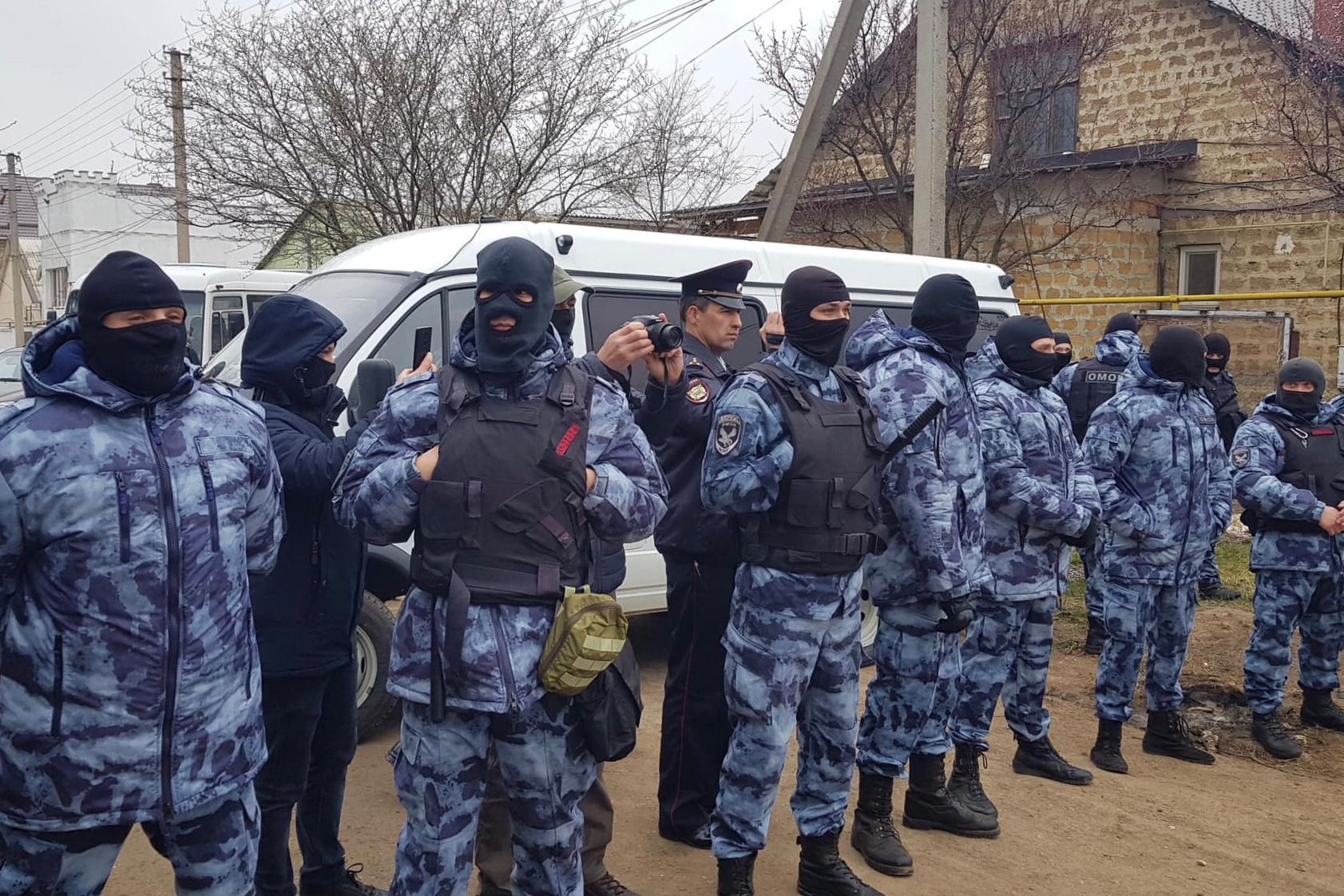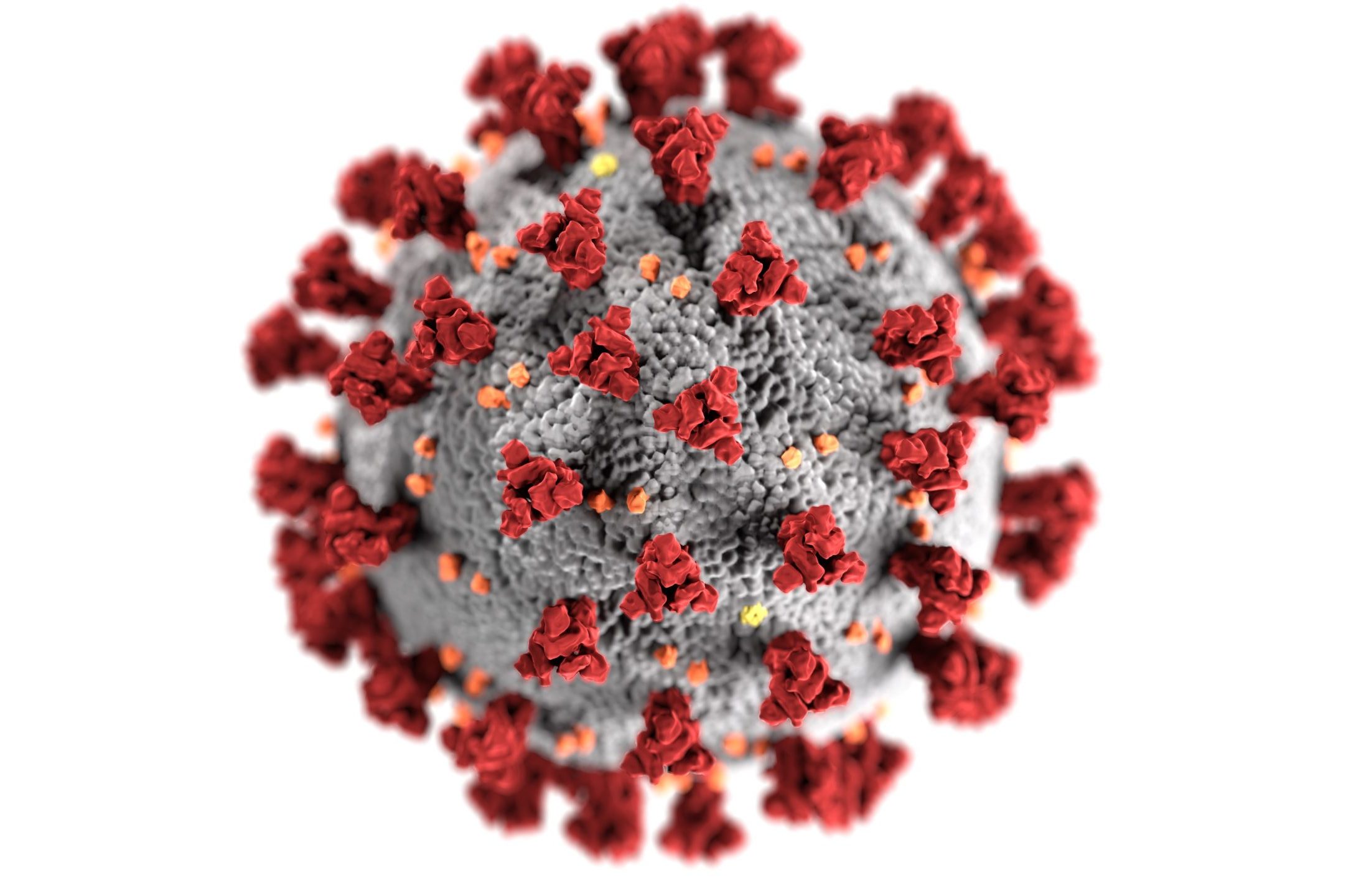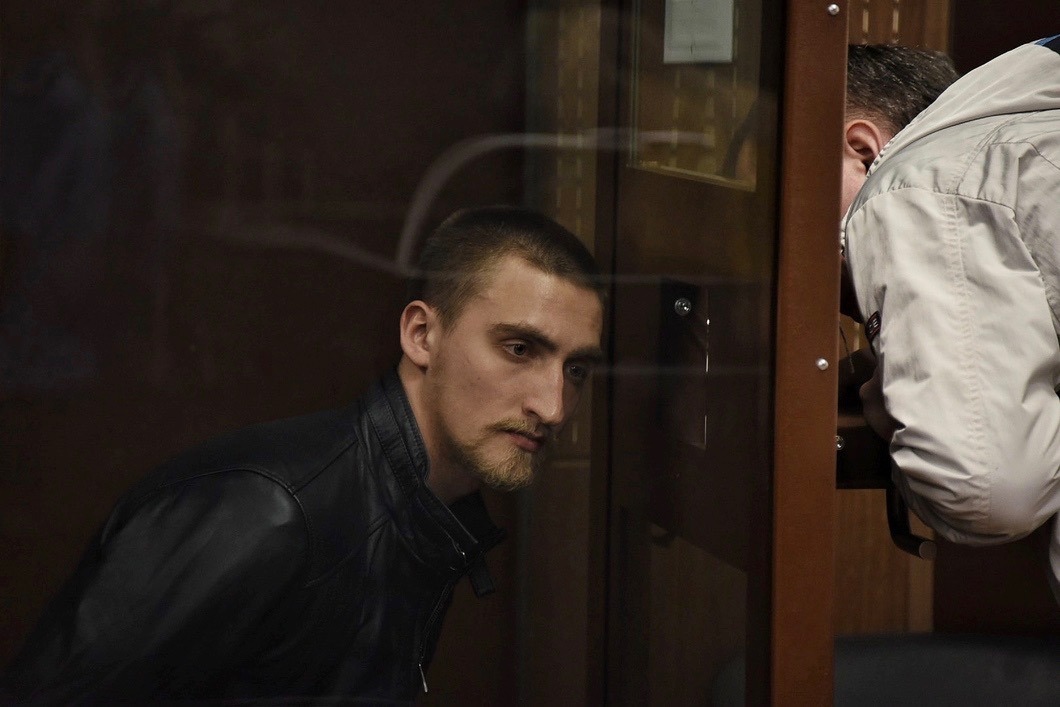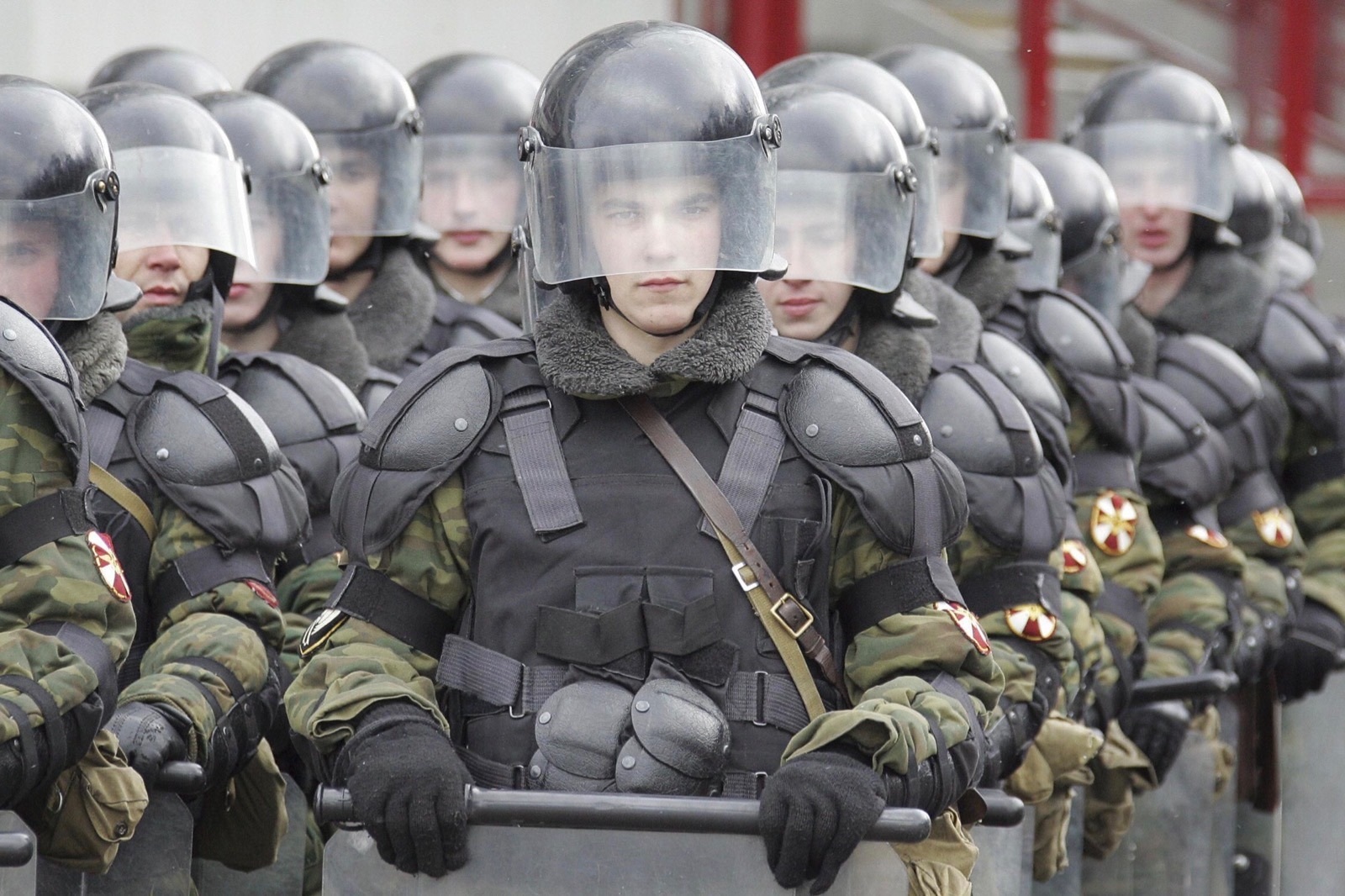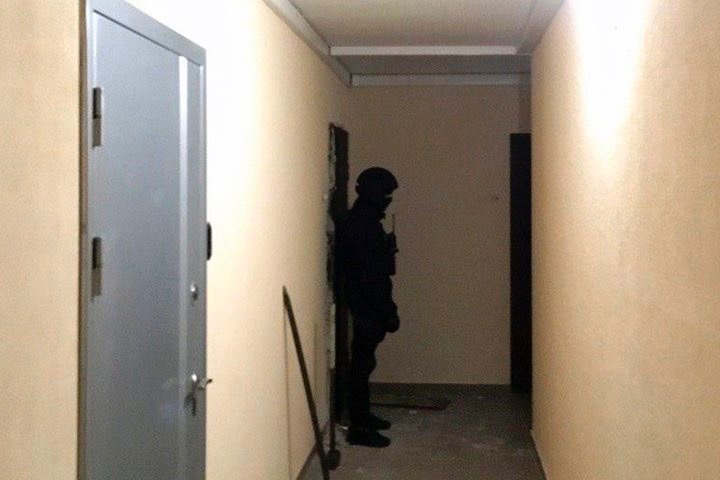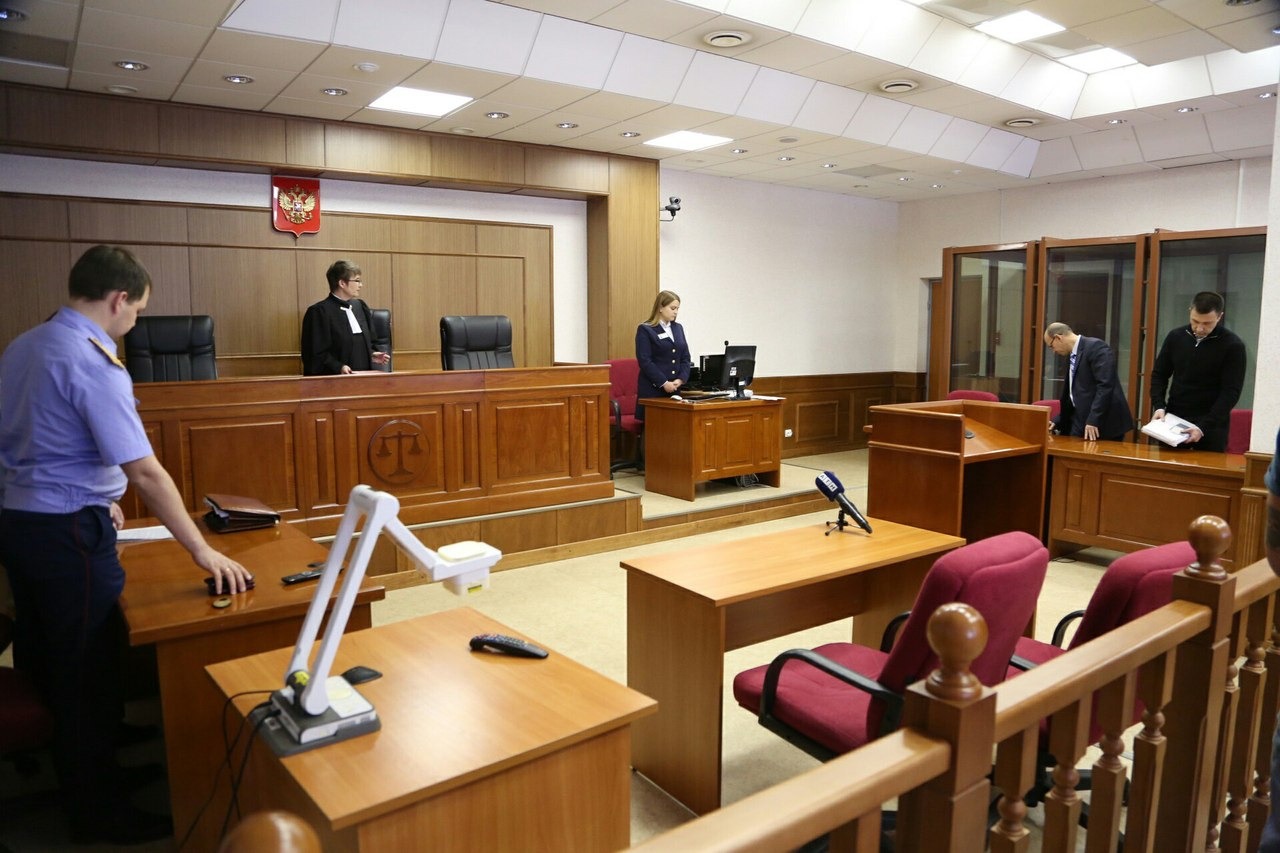On 27 March, security services in Crimea carried out the largest house search operation of Crimean Tatar homes since Russia annexed the peninsula in 2014. Beginning at four o’clock in the morning, FSB, Interior Ministry and Russian National Guard personnel searched 27 homes in the Crimean Tatar villages of Stroganovka, Kamenka and Aikavan near Simferopol, as well as the Belgorod district.
According to lawyers and witnesses, the searches were carried out with numerous violations of procedure. Law enforcement surrounded Crimean Tatar homes, removed individuals’ mobile phones, forbid them from contacting their lawyers or from talking to their families. Russian personnel often behaved rudely, swearing and scaring children and women. They did not present themselves as officers of the law, and did not present a search warrant or search report.
“I arrived at the search, and informed them that I represent Edem Yayachikov,” said lawyer Edem Semedlyayev. “I showed them my license. I was told to wait while the chief of the investigative group decides what to do. Two hours later, still no one had come out to see me. Usually the FSB refers to the fact that the investigation has already begun and that the lawyer is too late. But if you follow this logic, then every Crimean Tatar family should sleep next to their lawyer in case they are searched.”
In several houses, law enforcement broke down doors, and did not permit residents to observe how the search of other rooms was conducted – it was in these rooms that officers later found banned literature. Aside from books and pamphlets, law enforcement found nothing illegal in any of the houses searched. Later, an FSB press office stated that a “significant amount of propaganda materials, communications devices and electronic carries of information” had been confiscated. According to the FSB, these items had “been used in the course of terrorist activity”.
Meanwhile, having found out about the operation from social media, neighbours, relatives and activists, including Crimean Tatars from other villages and cities, gathered outside the encirclement. In Stroganovka, law enforcement ordered the crowd to disperse, threatening administrative charges for participation in an unsanctioned public event. In Kamenka, law enforcement forcefully detained two Crimean Tatars, Eskender Mamutov and Emil Ziyadinov, for filming the police on their mobile phones. Later that evening, both men were sentenced five days of administrative arrest for “minor hooliganism” and a 500 rouble fine for “not complying with the legal request of a police officer”.
“They detained me roughly and beat me,” says Emil Ziyadinov. “I remember how one riot policeman told another not to hit me, because someone was filming. When they took me into the car, they swore and talked to me roughly. At the police station they removed the handcuffs and acted normally towards me.”
By midday on 27 March, Russian law enforcement had taken 20 people to Crimean FSB headquarters on suspicion of their involvement in Hizb ut-Tahrir, an Islamic political organisation. In Russia, Hizb ut-Tahrir is a designated terrorist organisation, but in Ukraine it is allowed to operate legally. Four more Crimean Tatars – Remzi Bekirov, Osman Arifmemetov and Vladlen Abdulkadyrov from Stroganovka, as well as Edem Yayachikov – were not arrested at the time, as they were not at home at the time of the searches.
Law enforcement closed off Stroganovka in search of these suspects, setting up checkpoints outside the village. Prior to this, they visited all the houses in the district and, according to witnesses, broke into houses where no one was home. On the morning of 28 March, Bekirov, Arifmemetov and Abdulkadyrov were detained in the Russian city of Rostov-on-Don. The whereabouts of Edem Yayachikov are unknown. His wife Susanna has filed a report that her husband has been kidnapped. Lawyer Edem Semedlyayev believes Yayachikov has been detained by FSB officers, and is concerned for the life and health of his client.
“Internal enemies”
In the five years since the annexation of Crimea, Ukrainian, Russian and international human rights organisations have reported the fierce persecution of dissidents on political and religious themes. Activists, whether pro-Ukrainian or those who oppose the local authorities, are mostly prosecuted under extremism legislation. These cases include those of RFE/RL journalist Mykola Semena, deputy chairman of the Crimean Tatar Mejlis assembly Ilmi Umerov, or Sudak anti-corruption activists Dmitry Dzhigalov and Oleg Semyonov. At the same time, representatives of religious groups are imprisoned on terrorism charges.
The Crimea Hizb ut-Tahrir case is the largest in terms of the number of people charged and convicted on the peninsula. In December 2018, a Russian military court in Rostov-on-Don sentenced eight Crimean Muslims from Sevastopol and Bakhchisaray to terms of between five and 17 years.
Another five groups – 23 people in total – are under pre-trial investigation or in court. Ukraine deems them all political prisoners. These men spend the majority of their time in terrible conditions in Simferopol pre-trial detention centre. Here, many defendants’ health has significantly deteriorated. Some of them, such as Arsen Dzhepparov and Uzeir Abdullayev, are now barely alive due to the lack of medical attention. Together with the 24 new suspects, the number of defendants in the Crimean Hizb ut-Tahrir cases has reached 55 men – the vast majority of whom are observant Crimean Tatars.
Prior to annexation, Crimean law enforcement showed no interest in supporters of Hizb ut-Tahrir; the latter regularly held conferences and organised demonstrations. Russian law enforcement explain their investigations by referring to the declared aim of this movement (“spreading Islamic ideology across the whole world”), but choose to ignore their methods, which are non-violent. Radical Islamic groups have previously criticised the party for “diverging from jihad”.
Amnesty International, Human Rights Watch, Memorial Human Rights Center, Civic Assistance Committee and the Sova Center systematically declare that the offences, which the defendants are charged with, and the sentences they receive under the Russian Criminal Code are disproportionate. They have declared the defendants political prisoners and call for their immediate release.
“These are what we call ‘serial’ cases. The FSB gets ‘big results’ (dozens of convictions) with minimal effort, carrying out prosecutions en masse where no crime has been committed,” notes the Memorial Human Rights Center. According to Memorial, 251 people in Russia have been imprisoned in these kind of cases – although this list is “far from complete”, the center says.
“Hizb ut-Tahrir has not been convicted of a single terrorist act,” says Svetlana Gannushkina, chairperson of the Civic Assistance Committee. “I am convinced that turning activists in this party into martyrs will only bring more people into its ranks. There’s also no grounds to convict them for ‘preparing to overthrow the constitutional order’, just like there’s no grounds to convict Communists for the idea of building Communism across the whole word.”
In effect, the criminal cases against Hizb ut-Tahrir are based on “thought crimes”. The investigation does not need to prove whether the defendants prepared or even considered a carrying out a terrorist act – it’s enough to call them adherents to the ideology of Hizb ut-Tahrir.
But the FSB in Crimea often has difficulty doing so. The whole array of evidence for each group of defendants consists of insubstantial, according to the defence, forensic psycho-linguistic and religious analyses. These forensic analyses are carried out by “friendly” experts, who examine secret video footage of defendants talking about political and religious themes from the point of view of Islam. The evidence also includes testimony from several secret witnesses, whom defendants recognise as people wishing them harm or people scared by the security services. Finally, the evidence includes Islamic literature and notes confiscated during house searches – the majority of these materials are not banned and prove nothing but the faith of their owners.
“The investigation claims that Hizb ut-Tahrir’s aim is to bring a world Caliphate to power by recruiting supporters,” says Alexey Ladin, who represents Yalta human rights defender Emir-Usein Kuku. “According to the investigation, when a district has more than 50% of [Hizb ut-Tahrir] supporters, they move to the second stage of their mission: taking power by a peaceful or violent methods. A group of six people [defendants in the Yalta Hizb ut-Tahrir case], who were under surveillance by the security services for half a year, recruited three people, according to the investigation.
“Rough calculations put Crimea’s population at two million people. In order to try and overthrow the authorities, they would need to recruit a million people. How long would it take even all four groups of defendants to recruit this number of people on the peninsula? But whatever the security services dream up, the courts will still consider their conclusions lawful and justified.”
The North Caucasus Military Court in Rostov-on-Don – the only court that examines terrorism cases in Crimea – has shown a skeptical attitude towards this evidence presented by the Crimean FSB. The judges initially sentenced four defendants from the Sevastopol Hizb ut-Tahrir case to the minimum sentences permitted, and requested that the investigation conduct further investigations of evidence presented for two other groups of defendants. According to lawyer Edem Semedlayev, the court “doesn’t know how to make [this evidence] into a sentence.”
“It’s obvious that they [the judges] looked at this mountain of falsifications and decided to free themselves of such a dirty case,” another lawyer commented on the Yalta case.
Targeting solidarity
Lawyers and Crimean Tatars call these most recent searches and detentions an attempt to destroy Crimean Solidarity – an organisation of relatives of political prisoners, activists and lawyers in Crimea. It was formed in April 2016 in order to support the families of defendants – both in terms of covering the cases and raising funds. For three years running, Crimean Solidarity has held monthly meetings where participants discuss the latest news from the trials of political prisoners, the needs of their families, activities for the children of prisoners, and strategies for informing their audience about the situation in Crimea.
Most people detained on 27 March are activists who have been live-streaming house searches for years, holding solitary pickets, helping the families of detainees, attending court hearings for political prisoners and organising supplies for them in pre-trial detention.
Several of those recently arrested have long come to the fore because of systematic pressure from the security services. For instance, Remzi Bekirov, an activist with Crimean Solidarity, has been sentenced to administrative arrest twice for “participating in an unsanctioned public meeting” (standing outside the house of activist Marlen Mustafayev during a house search) and “distributing extremist materials” (for two video clips saved on VKontakte in 2009-2010). Activist Riza Izetov has been detained three times, and his house was searched in 2017, but he has also previously been sentenced to administrative arrest for “participating in an unsanctioned public meeting” (supporting activist Marlen Mustafayev during a house search). Another activist, Ruslan Suleimanov, has also been sentenced twice on administrative charges.
These aren’t the first prominent Crimean Tatars to be arrested on terrorism charges. In February 2016, human rights defender Emir-Usein Kuku was arrested in the Yalta Hizb ut-Tahrir case – Amnesty International has since recognised him as a prisoner of conscience. In October 2017 and May 2018, Marlen Asanov, a businessman and charity organiser, and Server Mustafayev, rights defender and co-coordinator of Crimean Solidarity, were arrested in the Bakhchisaray Hizb ut-Tahrir case. Since March 2018, citizen journalist Nariman Memedeminov, who worked on the media arm of Crimean Solidarity, has been in pre-trial detention for “propagandising terrorism” (the evidence is several YouTube clips from 2013-2014). But the latest arrests are the first time an operation of this scale has been carried out.
Of the 23 men detained on 27 March, the FSB suspects 18 men of “participating in the activity of a terrorist organisation”. These are their names: Seiran Murtaza, Tofik Abudlgaziyev, Rustem Sheikhaliyev, Seitveli Seitabdiyev, Akim Bekirov, Bilyal Adilov, Medzhit Abdurakhmanov, Erfan Osmanov, Servet Gaziyev, Osman Arifmemetov, Vladen Abdulkadyrov, Yashar Muedinov, Asan Yanikov,Izzet Abdullayev, Dzhemil Gafarov, Alim Kerimov, Enver Ametov, Rustem Seitkhalilov and the still missing Edem Yayachikov
According to new amendments to Russia’s criminal legislation, they could face up to 20 years in prison. The remaining five men – Remzi Bekirov, Riza Izetov, Ruslan Suleimanov, Shaban Umerov and Farkhad Bazarov – are being treated as “organisers of the activity of a terrorist organisation”, which could mean life imprisonment.
“Return 166 children their fathers”
By the evening of 27 March, the Kiev district court in Simferopol had started choosing the means of restraint for the detained activists. These hearings were held over two days, and practically all of them were held behind closed doors.
Riot police officers surrounded the building, pushing away the more than 300 people who came to support the detainees – and warning them of possible administrative charges for an unsanctioned public meeting. On 28 March, law enforcement officers detained Tair Ibragimov, who was participating in a spontaneous protest in support of Crimean Solidarity – people were photographing themselves with placards “We are Crimean Solidarity” or “Give 166 children their fathers back”. Ibragimov was later released with a 15,000 rouble fine.
“The pressure brought to bear on Crimean Tatars and Muslims can be felt before you even get to the court,” said Emil Kurbedinov, the lawyer for Tofik Abdulgaziyev.
“A huge number of law enforcement officers are refusing to let people into the hearings. They state that the hearings are closed, and demand that people stand at least 150 metres away from the court.”
Kurbedinov said that the court refused to allow relatives and journalists to attend the hearings, and dismissed all the defence’s requests. According to Kurbedinov, Abdulgaziyev said to the court: “My only crime before you is that I am a Muslim.”
“Ruslan [Suleimanov] told the court that the administrative prosecutions for his presence near the home of Marlen Mustafayev during a search and a solitary picket, as well as the current criminal investigation, are links in a single chain and amount to pressure not only on him, but on Crimean Solidarity and the whole Crimean Tatar people,” said Suleimanov’s lawyer Lilya Gemedzhi.
Investigators requested that the court place all 23 detainees in pre-trial detention, despite their age, chronic medical conditions and children. Many of the men have small children and elderly parents who need their care. Three have pregnant wives.
“We presented the court with evidence that my client [Bilyal Adilov] supports five underage children, and that he is the family’s only breadwinner,” said Galina Akimova, Adilov’s lawyer. “His mother has diabetes, his brother cannot work due to a disability. Yet the court did not pay attention to our requests, and considered them insufficient grounds for house arrest.” Akimova also stated that the case has no evidence confirming the guilt of her client.
In its press release, the FSB limited itself to general phrases:
“Members of this organisation conducted anti-constitutional activity based on the doctrine of creating a so-called ‘Global Caliphate’, destroying the institutions of a secular society, and the violent overthrow of the current authorities. Using methods of conspiracy during their meetings, they distributed terrorist ideology among residents of the peninsula, recruiting Crimean Muslims into their ranks.”
By evening on 28 March, Simferopol’s Kiev district court had sent all detainees to investigative detention until 15 May. Not one of the 23 men admitted their guilt. According to detainees’ lawyers, after law enforcement officers transported the men, they did not use violent conduct towards them, with the exception of the three men detained in Rostov-on-Don. Vladen Abdulkadyrov stated to the court that officers had beaten him in the legs.
On the following day, lawyers could not find their clients neither in Simferopol pre-trial detention, nor in temporary detention centres, and relatives could not get their parcels accepted at jails. By evening on 29 March, it became clear that the Crimean Tatar detainees had been removed from the peninsula, and this information was confirmed by Crimea’s human rights ombudsperson Lyudmila Lubina. The investigators did not explain the reasons for this decision, and did not reveal the whereabouts of the 24 men (including the missing Edem Yayachikov) neither to their families, nor legal representatives. According to initial information, the men have been transferred to Rostov oblast and placed in five separate investigative detention centres. Sergei Makhnev, head of the FSB’s investigative group on this case, has not responded to requests for information.
On 1 April, lawyer Lilya Gemedzhi managed to visit Ruslan Suleimanov, her client, in Rostov Investigative Detention Centre No. 4. As it turns out, defendants were sent to Rostov by air, and were not informed where they were going. When defendants requested that their relatives be informed, and that they wanted to meet with the Ukrainian consul in Rostov, they were told “it wasn’t permitted”.
“All the airplane’s windows were covered,” Gemedzhi reported. “Everyone was removed from the plane with their hats over their eyes, as if they were dangerous criminals. Ruslan [Suleimanov] told me that he didn’t understand where he was. It was only in the evening, after he was given some documents in the investigative detention centre, that he realised he was in Rostov-on-Don.”
Meanwhile, Sergey Aksyonov, the self-proclaimed leader of Crimea, has publicly expressed his gratitude to law enforcement for their “professional, systematic work”. He proposed that residents who do not agree with the new regime’s policies should leave Crimea. “Any discussions of alleged repressions carried out on the peninsula is lies and demagoguery, an attempt to give this case a political colour […] Those who don’t respect the laws of the Russian Federation can find themselves somewhere to live anywhere else in the world. There’s nothing for these people apart from prison here.”

